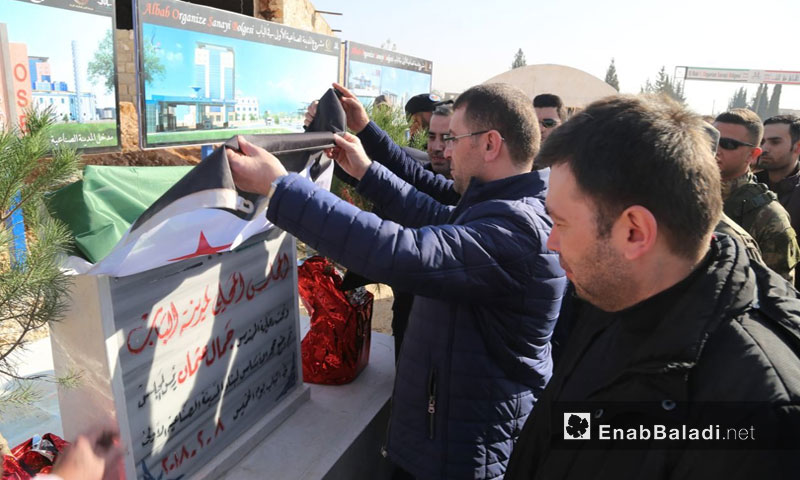On an area of 561 thousand square meters and in a strategic location, the departments of the first industrial city has been distributed, in northern Aleppo, after its corner stone has been laid in February 8, between the city of al-Bab and “al-Rai” crossing, which has been opened late in 2017, linking the areas held by the opposition and Turkey.
The city includes leather tanning and chemical, engineering, plastic, crafts, food, manufacturing, textile industries, in addition to service facilities. It is 5 kilometers away from the city of al-Bab and 25 kilometers from the al-Rai crossing.
The industrial city’s structure, which “al-Bab City Local Council” holds the responsibility of establishing, covers 436 thousand square meters of space prepared for selling, in addition to 2600 square meters to build four mosques inside the city and allocating other 9 thousand kilometers for service facilities.
Engineer Jamal Osman, the Head of al-Bab City Local Council, in an interview with Enab Baladi, said that the total area has been designed to be an industrial city after signing a memorandum of agreement with its original owner, who gave up about 13 hectares (ten thousand square meters) in favor for the Local Council, to sell the rest of the area to potential buyers.
The Council considers that the establishment of the city lies in the frame of “providing basic industrial materials and facilitating trade exchange in one area that gathers a large number of industrials; it also aims to raise the per capita income to the level of a decent livelihood and functions as a point to attract investors.”
Corner Stone
The corner stone has been laid by the head of the Local Council, in the presence of the assistance of the Turkish state of Gaziantep’s Governor and some of the area’s local bodies. Osman described the city as one of “the most prominent economic projects that help to revive the area and contribute to decreasing the unemployment ratios, considering that the liberated areas are witnessing a rapid increase in population after they have settled down.”
The city has many distinct features, according to the Council, on top of which are providing the services needed for infrastructure and spreading sewage and sulfur water networks. Osman confirmed that “transportation means would be secured, and the roads paved to accommodate the vehicles that would be entering and existing the area.”
The factions of the “Free Army” functioning under the “Euphrates Shield” operations room managed to take over the city of al-Bab in 23 February 2017, after confrontations that lasted since December 2016, and secured its surrounding of any presence relating to the “Islamic State” (ISIS).
The process of road construction and preparing services and sewage systems have already started. Over ten hectares have been sold as a land for building factories, according to the Council’s head, who explained that “areas have been allocated for selling to be bought by any person to build whatever he/she wants in a specified part, on the condition that thy get licensed at the Local Council.”
The price of a single meter of land ranges from ten to 16 dollars, based on the land’s location, according to Osman, who said that the industrial city would provide job opportunities for about six thousand people in six months.
Concerning Turkey’s role in the project, the Head of the Local Council indicated that it was advisory, “they welcomed the idea and supported its implementation. There will also be facilities for the city’s merchants later on.”
The City Contributes to Decreasing Crowdedness
Enab Baladi interviewed some of the area’s people, most of them stated that the ultimate benefit for them is lessening traffic and crowdedness within the city that houses dozens of thousands of people.
The city is a concentration point for various crafts and industries; some people believe that this would help to alleviate some of their burdens, describing “it as a market that you can go to and get all that you want in a single time.”
Other people consider that the city has witnessed a massive and a rapid renaissance, and some industrials expected that constructing it would be an advanced step to get an industrial register that protects the area’s rights.

